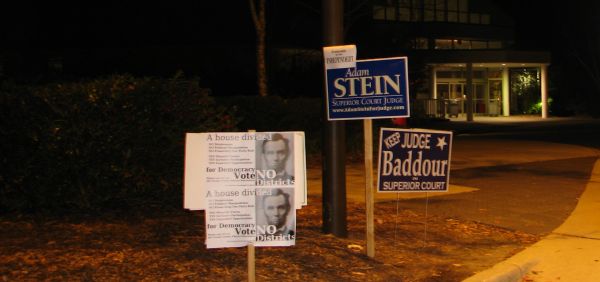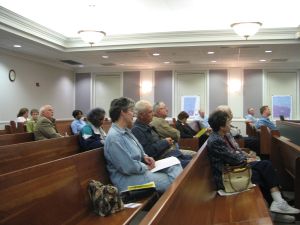A room chock-full of “real” journalists. Followed by media/PR consultants and then a sprinkling of citizen activists.
So far, introductions.
Local political whiz, former Council member, Gerry C is here – I look forward to meeting him face to face.
Anglico (Jim Protzman) and SouthernDem are here for BlueNC. SouthernDem is a great, citizen journalist.
Zabouti (George Entemann) , Kirk Ross (ExileOnJonesStreet), GSO’s Lex Alexander, Dave Hoggard (Hogg’s Blog) – former GSO Council candidate and now general pain-in-the-side of the current GSO political apparatchik.
It’ll be interesting to see if the conversations are dominated by the producer-side (media/journalism side of the house) or the consumer-side (folks like myself, the BlueNC’rs, etc.)
Ed Cone – the people that own news organizations are not interested in putting out high-quality journalism – the people working there want the highest quality product but are stymied by the “business”-side of journalism
WillR – “not here to kill traditional journalism” – want to strengthen journalistic institutions. I added my rant on how limiting the community’s access to their story – access to the “long tail” (i.e. paywalled archives of former articles) only serves to weaken the institution.
Jim P. (Anglico) – who watches the watchers – he jumps in on the benefit of ‘blogs as watchdogs of the journalistic institution.
Allen Robinson (N&R) – on managing comments on the N&R – starts with story on how the SBI contacted him ecause a commenter had threatened to blow up the civil rights memorial – moves on to comments in general – Mr. Sun argues they have an overly bureaucratic approach to managing comments – Allen argues that it requires too much staff time to weed out vulgarities or “name calling” – Mr. Sun can’t believe that they spend as much time – that they need to open up comments
The audience joins in an speaks about “wisdom of crowds” type solutions to the comment problem.
Democratic Underground approach of putting a “think button” on their blog to let the community notify the admins of questionable content. Allen says their email would overflow. I think of Slashcode that runs Slashdot – it allows the community to vote comments up-or-down based on the community’s own standards (and also a peppering of “special” designated users). I suggested this to John Hood of the John Locke Foundation last year when he expressed concern about allowing folks to call out his Pope supported think-tank on their own website. I suggested that the critical mass of their “type” readers could squelch dissent quite fine 😉
Kirk Ross – the business of journalism is not willing to fund R&D – every other type business invests money in developing new technology and strategies to meet change head-on – traditional media organizations, especially print, is not willing to invest money or time in developing methods to deal with new trends.
Killian –
Doug Fisher – newsrooms are manufacturing operations – Allen is talking cost not profit – the big hump is to understand they’re in a service business not a manufacturing business….journalism is a cottage industry…
newspapers as aggregators…
Audience – comments as profit centers – some newspapers take the LTE’s and online comments – put them on paper – wrap them in ads and turn them into profit centers
Fisher – let’s change the term from newspaper to newsroom – newspaper implies manufacturing
Wendy – driving attention to your site – do a stunt – get on Romanesko – get A-listers to jump in – “money,stroking,money,stroking” – when the hits go through the roof your publisher might pay attention [ I think it might take the ‘blog-o-sphere breaking a story and making lucre on it time after time before they’ll pay attention]
Gerry – he knows that politicos read ‘blog entries, comments, etc. and send them on to their staff to find out about – that this new medium is having current and direct influence on the political sphere…
Audience – “we’ve been dealing with this since the days of Compuserve” – there’s been this tension with commenting for a long time – moderated vs. unmoderated discussion groups – the group that would succeed was the one with the highest “signal-to-noise” ratio.
John Hall – John Locke rep. – newspapers aren’t interested in local content – reporting what the community wants – instead they report/print what the editor wants…
Roche – problem with purchasing ads online – email Roanoke Rapids paper publisher couldn’t get a rate card, took weeks to get rate cards from others, Charlotte.com turned it around right away – someone in the audience comments “they must like making money” – utility of ‘net escapes folks that are interested in profit but don’t how to understand monetization…


 http://scienceblogs.com/clock/
http://scienceblogs.com/clock/

